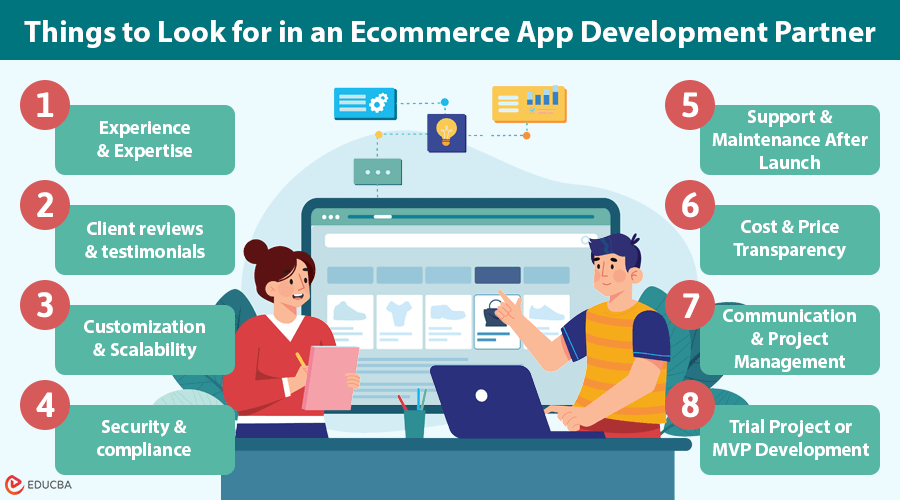
Introduction to Ecommerce App Development Partner
Choosing the right ecommerce app development partner is key to building a successful online business. A well-designed e-commerce app improves user experience, increases sales, and streamlines operations. With so many agencies and freelancers available, getting overwhelmed is easy. Explore key considerations while choosing e-commerce app development partner for smooth, successful collaboration through this guide.
Understand Your Business Needs
Make clear the business objectives and application requirements before selecting a development partner. Consider the following:
- Target Audience: Who will use your app? Knowing the audience helps in designing the features that drive the application.
- Business Model: Will the application be B2B, B2C, or marketplace-related? If you are aiming for a marketplace solution, exploring options like a multivendor ecommerce marketplace can help you visualize and plan the platform architecture you need.
- Must-have Features: Choose business-critical features such as payment gateways, inventory management, personalized recommendations, and push notifications.
- Technology Preferences: Decide whether you want a native app (iOS, Android) or a cross-platform solution.
- Budget and Timeline: Define the budget and time to finish the project.
Key Things to Look for in an Ecommerce App Development Partner
While selecting a perfect ecommerce app development partner, you must consider the partner company’s competence, reliability, scalability, and support services for successful long-term cooperation.
#1. Experience and Expertise
An experienced development partner brought technical expertise, industry understanding, and proven methodologies. Evaluate:
- Portfolio: You can view and evaluate previous e-commerce projects for quality and innovation.
- Technology Stack: Ensure that they specialize in the technologies relevant to your project (e.g., React Native, Flutter, Swift, Kotlin, Magento, Shopify, WooCommerce, or custom frameworks).
- Domain Knowledge: Try to find a developer with experience in e-commerce so that he can understand business challenges and best practices for developing e-commerce websites.
#2. Client reviews and testimonials
Client feedback is indicative of his quality and reliability as a developer. Some references are:
- Online Reviews: Reviews on sites such as Clutch, GoodFirms, and Trustpilot. We can learn from other industries, such as hospitality, where the cost of a bad review can significantly affect future clients’ selection of a specific business.
- Case Study: Information on the problem that the developer helped solve.
- Client references: You can ask former clients to provide references about their experience.
#3. Customization and Scalability
Developers must consider the app’s flexibility and ability to support future business growth during development. The development partner would offer:
- Custom-fit Solutions: Do not use a prepackaged, one-size-fits-all approach; have a tailored solution.
- Scalability: Handle high loads and lots of products without suffering performance degradation.
- Integration Capability: Ability to do that with third-party tools such as CRM, ERP, analytics, and payment gateways.
#4. Security and compliance
Security is among the most important factors for an e-commerce application that works with customers’ sensitive information, like payment details. Consider:
- Data Protection: Encryption, two-factor authentication, and secure APIs
- Compliance: Have the application comply with other regulatory standards like GDPR and PCI-DSS.
- Regular security updates: proactively patch any vulnerability and secure the app.
#5. Support and Maintenance After Launch
Developing the application includes updating, fixing bugs, and adding new features. Your development partner should put in place:
- Ongoing Support: Ensure availability to address and solve problems that arise after the launch.
- Regular Updates: Keep the app running on the latest OS and technology trends.
- Performance Monitoring: Thus, users have the scope to identify and fix cases of sluggish loading time or crashing.
#6. Cost and Price Transparency
E-commerce application development prices vary based on the features offered, application complexity, and the development team’s expertise. Always keep the following in mind:
- Transparent Pricing: Developers should give clear cost breakdowns to avoid hidden charges.
- Flexible Engagement Models: Fixed-price, time & material, or a dedicated team based on project need models.
- ROI Analysis: The development cost against possible return on investment should be analyzed.
#7. Communication and Project Management
Communication and project management are like partners interfacing with each other in a very respectful way. Here ensuring:
- Foolproof Communication Channels: Regular updates via email, Slack, Zoom, or project management tools like Jira, Trello, or Asana will suffice.
- Defined Milestones: Logical and concise development periods stretching over days/weeks involving deliverables or review sessions.
- Culturally Compatible: That collaboration may run smoothly, notwithstanding any possible geographic barriers.
#8. Trial Project or MVP Development
Instead of booking the full development contract, you might want to consider a trial project or Minimum Viable Product (MVP) so that you could:
- Test the Collaboration Efficiency: Determine how well, fast, and good the work is going.
- Learn Their Technical Capability: Confirm they have what it takes to meet your requirements.
- Risk Reduction: Doing so will lower the investment risk before fully developing.
Red Flags to Watch Out For
Please pay attention to these warning signals when selecting a development partner to avoid high-cost blunders, making the e-commerce development experience even.
- Unrealistic Pricing: There are normal reasons for extremely low prices offered by vendor development partners: bad quality work, hidden costs, and lousy performance. With that, you will often pay them far more later for fixes and enhancements.
- Lack of Communication: A lack of communication by the development team is a sure way of delaying the project, creating misinterpretations of issues, and misaligning expectations, which results in a successful e-commerce platform.
- No Need for a Proven Track Record: Building and designing an e-commerce site without prior experience means making an unreliable solution, exposing security holes and shortcomings in other critical areas like payment processing and user experience optimization.
- No Support After Launch: Under-maintained and unsupported e-commerce could be hit by security breaches, downtimes, and performance-related issues, which would lead to revenue losses and irritation in customers’ and stakeholders’ minds.
- Restricted Customization: If your development partner only uses generic templates, your online store will lose its unique branding and scalability, and vital features will be limited in the future to support growth or adaptability to market demands.
Final Thoughts
Selecting the right ecommerce app development partner is crucial for your online business’s success. Carefully evaluate factors such as experience, client reviews, security measures, scalability, and post-launch support. By doing thorough research and making an informed decision, you ensure a smooth collaboration and the long-term success of your e-commerce app. Take your time to choose a development partner who aligns with your budget, vision, and goals. This decision will significantly impact the future success of your e-commerce app.
Author Bio
Divyesh Bhatasana is the visionary founder of Jeenam, a B2B SaaS link-building agency known for delivering top-notch link-building services that drive real results.
Recommended Articles
We hope this guide on choosing the right ecommerce app development partner helps you build a successful and scalable online store. Explore these recommended articles for more expert tips and strategies to grow your eCommerce business.


